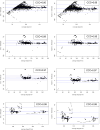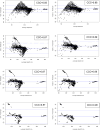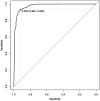Fitbit's accuracy to measure short bouts of stepping and sedentary behaviour: validation, sensitivity and specificity study
- PMID: 38894943
- PMCID: PMC11185038
- DOI: 10.1177/20552076241262710
Fitbit's accuracy to measure short bouts of stepping and sedentary behaviour: validation, sensitivity and specificity study
Abstract
Objective: This study aims to assess the suitability of Fitbit devices for real-time physical activity (PA) and sedentary behaviour (SB) monitoring in the context of just-in-time adaptive interventions (JITAIs) and event-based ecological momentary assessment (EMA) studies.
Methods: Thirty-seven adults (18-65 years) and 32 older adults (65+) from Belgium and the Czech Republic wore four devices simultaneously for 3 days: two Fitbit models on the wrist, an ActiGraph GT3X+ at the hip and an ActivPAL at the thigh. Accuracy measures included mean (absolute) error and mean (absolute) percentage error. Concurrent validity was assessed using Lin's concordance correlation coefficient and Bland-Altman analyses. Fitbit's sensitivity and specificity for detecting stepping events across different thresholds and durations were calculated compared to ActiGraph, while ROC curve analyses identified optimal Fitbit thresholds for detecting sedentary events according to ActivPAL.
Results: Fitbits demonstrated validity in measuring steps on a short time scale compared to ActiGraph. Except for stepping above 120 steps/min in older adults, both Fitbit models detected stepping bouts in adults and older adults with sensitivities and specificities exceeding 87% and 97%, respectively. Optimal cut-off values for identifying prolonged sitting bouts achieved sensitivities and specificities greater than 93% and 89%, respectively.
Conclusions: This study provides practical insights into using Fitbit devices in JITAIs and event-based EMA studies among adults and older adults. Fitbits' reasonable accuracy in detecting short bouts of stepping and SB makes them suitable for triggering JITAI prompts or EMA questionnaires following a PA or SB event of interest.
Keywords: Fitbit; JITAI; accelerometry; ecological momentary assessment; event-based ecological momentary assessment (EMA); just-in-time adaptive intervention; physical activity; sedentary behaviour; step; wearable.
© The Author(s) 2024.
Conflict of interest statement
The author(s) declared no potential conflicts of interest with respect to the research, authorship, and/or publication of this article.
Figures



Similar articles
-
Sensor-triggered ecological momentary assessment in physical activity and sedentary behaviour research among Belgian community-dwelling elderly: lessons learnt from intensive longitudinal studies.BMJ Open. 2025 Apr 3;15(4):e096327. doi: 10.1136/bmjopen-2024-096327. BMJ Open. 2025. PMID: 40180404 Free PMC article.
-
Validity of the activPAL and ActiGraph for measuring sitting time and steps in hospitalised orthopaedic patients with altered weight bearing.Disabil Rehabil. 2024 Jan;46(2):378-386. doi: 10.1080/09638288.2022.2157896. Epub 2022 Dec 21. Disabil Rehabil. 2024. PMID: 36541196
-
Validity of Fitbit's active minutes as compared with a research-grade accelerometer and self-reported measures.BMJ Open Sport Exerc Med. 2017 Sep 13;3(1):e000254. doi: 10.1136/bmjsem-2017-000254. eCollection 2017. BMJ Open Sport Exerc Med. 2017. PMID: 29018543 Free PMC article.
-
Methodology Used in Ecological Momentary Assessment Studies About Sedentary Behavior in Children, Adolescents, and Adults: Systematic Review Using the Checklist for Reporting Ecological Momentary Assessment Studies.J Med Internet Res. 2019 May 15;21(5):e11967. doi: 10.2196/11967. J Med Internet Res. 2019. PMID: 31094349 Free PMC article.
-
Validity of objective methods for measuring sedentary behaviour in older adults: a systematic review.Int J Behav Nutr Phys Act. 2018 Nov 26;15(1):119. doi: 10.1186/s12966-018-0749-2. Int J Behav Nutr Phys Act. 2018. PMID: 30477509 Free PMC article.
Cited by
-
Adolescents' Daily Lives (ADL) project: an intensive longitudinal design study protocol examining the associations between physical literacy, movement behaviours, emotion regulation and mental health.BMJ Open. 2024 Nov 20;14(11):e094225. doi: 10.1136/bmjopen-2024-094225. BMJ Open. 2024. PMID: 39572095 Free PMC article.
-
Participatory development of an mHealth intervention delivered in general practice to increase physical activity and reduce sedentary behaviour of patients with prediabetes and type 2 diabetes (ENERGISED).BMC Public Health. 2024 Mar 31;24(1):927. doi: 10.1186/s12889-024-18384-2. BMC Public Health. 2024. PMID: 38556892 Free PMC article.
-
Sensor-triggered ecological momentary assessment in physical activity and sedentary behaviour research among Belgian community-dwelling elderly: lessons learnt from intensive longitudinal studies.BMJ Open. 2025 Apr 3;15(4):e096327. doi: 10.1136/bmjopen-2024-096327. BMJ Open. 2025. PMID: 40180404 Free PMC article.
-
Contexts, affective and physical states and their variations during physical activity in older adults: an intensive longitudinal study with sensor-triggered event-based ecological momentary assessments.Int J Behav Nutr Phys Act. 2025 Mar 7;22(1):30. doi: 10.1186/s12966-025-01724-9. Int J Behav Nutr Phys Act. 2025. PMID: 40055798 Free PMC article.
-
Ecological momentary assessment of physical and eating behaviours: The WEALTH feasibility and optimisation study with recommendations for large-scale data collection.PLoS One. 2025 Feb 11;20(2):e0318772. doi: 10.1371/journal.pone.0318772. eCollection 2025. PLoS One. 2025. PMID: 39932907 Free PMC article.
References
-
- Schuch FB, Vancampfort D, Richards J, et al. Exercise as a treatment for depression: a meta-analysis adjusting for publication bias. J Psychiatr Res 2016; 77: 42–51. - PubMed
-
- Rezende LFM, Sá TH, Mielke GI, et al. All-cause mortality attributable to sitting time: analysis of 54 countries worldwide. Am J Prev Med 2016; 51: 253–263. - PubMed
-
- Shrestha N, Grgic J, Wiesner G, et al. Effectiveness of interventions for reducing non-occupational sedentary behaviour in adults and older adults: a systematic review and meta-analysis. Br J Sports Med 2019; 53: 1206–1213. - PubMed
LinkOut - more resources
Full Text Sources
Research Materials

